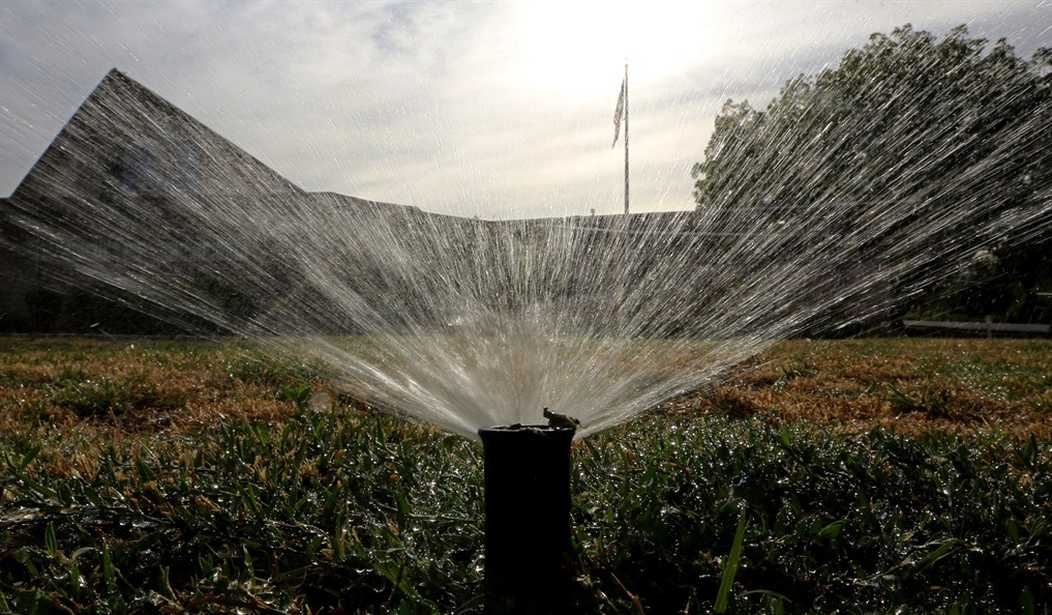Which is worse, paying for stuff you use . . . or being constantly harassed for using it?
There is talk of drought, these days, in several states of our union. And governments, local and state, are becoming draconian. Further, the moralistic crowd is out, telling us to conserve water as if it were a moral imperative on the order of Do No Murder or Thou Shalt Not Steal.
This is the world of hyper-regulation of hydro-usage, the penalizing — even criminalizing — of consuming “too much” H2O.
To deal with its drought, California now regards it as criminal to “waste” water. Don’t hose down that sidewalk! Las Vegas tries to save water by paying people to rip out their lawns. No more making deserts bloom, make room for the desert at one’s doorstep. The EPA is developing technology to force hotels to monitor guests’ specific water usage. Did you really need to flush that?
We used to think of droughts as things third world countries had to undergo.
Nowadays, perhaps under the influence of the ideology of Anthropogenic Global Warming, a lot of folks seem resigned to accept droughts and city desertification as inevitable, as just a natural consequence of “runaway civilization.” But there’s a problem here. More than one.
First, and contrary to Al Gore, a slightly warmer planet does not necessarily mean a universally drier climate. Talk to a real climate scientist, and she is likely to inform you that warmer temperatures will lead to more precipitation in many places. Desertification is not a global phenomenon, and there is no reason to accept drought as somehow “natural” or “what we deserve” for living in cities.
Second, a depletion of resources is an economic problem. That goes for water as well as widgets. And economic problems arise from incentives and disincentives based on government policy. Perhaps most folks today forget the great lesson of my youth: that the worst droughts in third world countries almost ineluctably hit Marxist countries.
Recommended
Socialism isn’t good for water. Or crops. Or even pollution reduction. Socialism wastes resources, because government bureaus cannot handle the dispersed information that would allow us to direct resources to their most-valued uses.
The truth is, in too much of America, water resources are run and managed by governments, and government bodies — as if they were mythically competent Soviet boards — set “prices” of water.
Allocating water not by price, really, but pricing to allocate to favored constituencies.
Hence the looming water shortage.
Yes, and I repeat: the failure to charge market prices for water leads to shortages, and then to all the bullying about water usage. How muchbetter would it be were we to give up on politicizing water rationing, and, instead, ration by price. Using the costs associated with prices on open markets as the guidance for conservation.
We really shouldn’t have needed a special domain of economic thought — a whole school — to understand this. (But we do have a special domain, and at least one very interesting school of economics devoted to resources, institutions, and property rights, this latter having devoted several decades now to the study of just these problems I am now addressing.) In unhampered markets, sudden and big drops in supply tend to cause sudden and big rises in prices. People economize without being forced. If you must pay more for orange juice because of frozen crops, you either buy less juice or buy less of something else (if orange juice is your favorite thing). But the shelves don’t go bare.
The worse supply problems that arise (let’s say, as a result of growth, or unexpected weather change), the higher the prices, the more customers economize, the more producers produce. So when there’s a local drought, what will a water company do (as opposed to an overweening water authority)?
- Charge more.
- Pipe in water from other regions.
- Desalinization using new technology, maybe even thorium reactors, for all I know.
And other solutions I can’t think of offhand . . . because I’m not running a water company. I lack the direct incentive that the possible profit from solving the problem provides.
Let people cooperate with each other. Let prices “float,” according to supply and demand. That is how we will solve our water problems. Without governmental bullying.
The water will come like rain.

























Join the conversation as a VIP Member